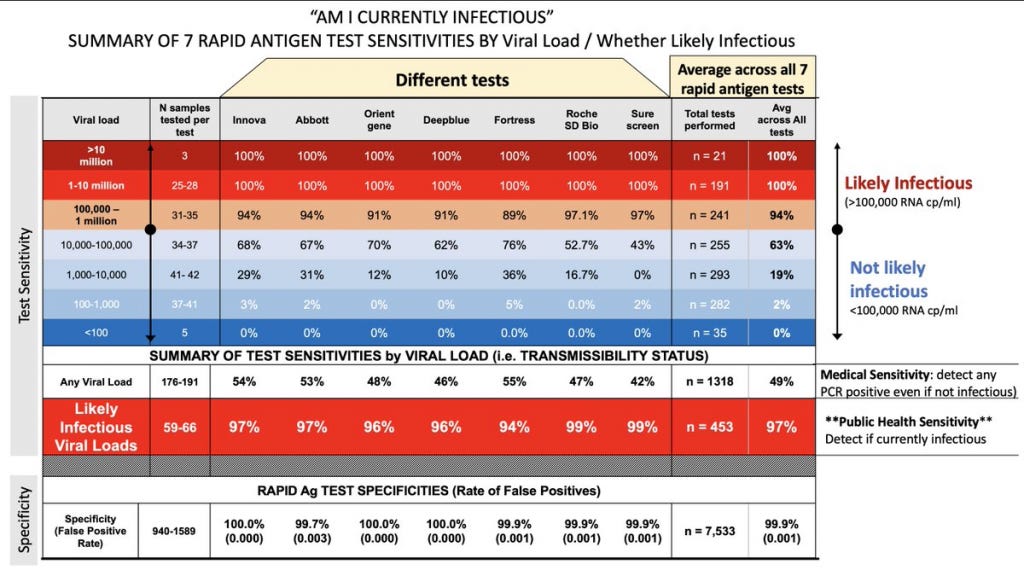Should I take a rapid antigen test before visiting a vulnerable person (e.g. an immunocompromised parent)? What about before hosting a gathering or attending a big event?
The short answer: Yes, yes, and yes!
Shortest post ever. JK. There is always nuance to consider when we talk about testing, because no test is perfect.
Let’s start with the good news:
Rapid antigen tests are very good at picking up the most infectious COVID-19 cases – those carrying a lot of virus in their schnoz. You can expect a rapid test to catch 97% or more of these “red hot” cases, though exact numbers vary depending on test, user, symptoms, and population. If you test twice, 24-48 hours apart, the chances of missing a “hot” case drop even more.
Now for the bad news:
There is a small chance that someone could get a negative rapid test but still be contagious. If a test catches 97% of “hot” cases, this leaves another *️3%*️ of cases that slip through (with a single test). Rapid antigen tests can also miss a lot of cases with low amounts of virus, but these are far less likely to be contagious (though not impossible).
There is also a small chance of being told that you have COVID-19 when you don’t. Around 1 in 100 rapid antigen tests will be “false positives”, though rates vary across tests, users, and populations.
Hot tip: Be skeptical of a rapid test showing a faint line, or that is weaker than the control line. Many false positives are borderline.
If you get an unexpected positive result, take a deep breath. When used to screen low-risk people (no symptoms, low COVID-19 exposure), rapid antigen tests can return more false positives (1%) than true positives (<1%)! See link below for a related DP post on the mind-bending problem of positive predictive value.
The Bottom Line
Rapid antigen testing is a powerful layer of protection. It can slash the chances of exposing your high-risk loved one or bringing COVID-19 to the party. Even though it’s imperfect, rapid testing is far better than not testing.
Always bear in mind the limitations of testing:
A negative test should not be seen as a zero risk pass. It’s wise to continue using other layers of protection, especially when exposing vulnerable people.
A positive test could be a false positive, especially if you have no symptoms or known exposure. These falsies are rare (about 1 in 100) but can seriously throw a wrench into your life. If you get a positive test, isolate, then follow up with PCR to verify.
We Nerdy Girls feel that testing is still worth the protection we can bring to others and to ourselves, despite these limitations.
Last but not least, a word on accessibility. At $12-$30 per test, at-home testing is out of reach for many people in North America. In Europe, governments have recognized the value of rapid testing and made them freely available. We are dismayed at the lack of government support for testing here in North America and hope to see this change over time.
If you do have access to testing, either PCR or rapid antigen testing, please take advantage of it and TEST TEST TEST!
(Huge thanks to Nerdy Girl Dr. Chana Davis (Fueled by Science) for writing this post. You’ll be hearing more from her as a DP writer!)
Links:
Twitter Thread and image credit from Dr. Michael Mina (Harvard advocate for rapid testing)
Rapid test (lateral flow) performance studies:
Recent News on Rapid Testing:
Dear Pandemic Previous Posts on Rapid Testing:
Do you have practical advice for families around testing for COVID-19?
Are over-the-counter COVID-19 tests reliable?
Why are there so many tests for COVID-19? How do I know which one is best for me?
New Rapid Home Test for COVID-19
IN CASE YOU MISSED IT...
Who is eligible for a third dose of the COVID-19 vaccine?
What should I do if I lose my COVID vaccination card?
If you have a COVID question, let us know!
We read every question and use them to inform our upcoming content, though we are unable to respond to each specific question.
Dear Pandemic by Those Nerdy Girls is a 501(c)3 non-profit organization dedicated to providing credible, curated, and timely information about science and the COVID-19 pandemic. Our mission is to empower individuals to successfully navigate information overwhelm. Financial contributions help us fund our operations and are tax-deductible.




